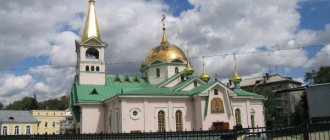How to remember if a relative died during Lent?
Christians believe in the immortality of the soul, so commemorating deceased relatives is important and filled with deep meaning. The newly deceased has passed his life's path; according to his deeds, he will give an answer and end up in the kingdom of God or hell. But close relatives can soften his fate with prayers.
A special period of time deserves special attention: Lent and the bright holiday of Easter.
Lent is a period of mourning, abstinence, thoughts about the soul and a kind of preparation for the afterlife. During this period, the death of a significant relative is perceived as especially tragic. Loved ones are often lost and have difficulty in how to pray and remember if a person died a week before Easter.
The Orthodox Church gives a clear sequence of actions, but various signs and superstitions in this regard are widespread among the people.
In the distant past, it was believed that God called the maximum number of souls during Lent. Statistics from funeral agencies confirm that the spring months see the largest influx of buyers.
Recommendations from priests
During Lent, the deceased are remembered in a special order:
- Liturgical commemoration is not held from Monday to Friday, only the Full Liturgy is served on Saturday and Sunday.
- There are no funeral services.
- Funeral litany and memorial services are served only on the 1st, 2nd, 3rd, and 4th Saturdays of Great Lent.
- The funeral service for the deceased can be held on any day.
Traditional memorial rituals on the 3rd and 9th days are transferred to the two Saturdays closest to the date of death. Likewise, the forties during the period of fasting are moved to Saturday. The same goes for organizing a funeral meal.
Death at Easter
I first entered the Russian Orthodox Church in 1992 - that was the time when the state was clearly collapsing, when the old ideological axioms were suddenly presented by the old communist propagandists as obvious nonsense and were viciously ridiculed. It seemed that society was turning into a cruel booth of depravity, where there would no longer be a place for anything sacred, for nothing that we kept within ourselves and sought to protect, at least in the depths of our souls.
After receiving Holy Baptism on December 29, 1992, a new, hitherto unknown Universe opened up for me - the Universe of Light and Goodness, the Universe of the Feat of Love, and it was very interesting to learn about this Universe through personal experience of church life, through the examples of Holy Scripture and Holy Tradition.
I, as a successful production commander and a former propagandist of Marxism-Leninism, was immediately interested in the timing of the Last Times - when they will begin to arrive, and from what moment the physical life of a Christian will become dangerous, from the point of view of possible failure to enter the Kingdom of Heaven - because cruel things will await ahead temptations and cruel trials that you may not be able to withstand, betray Christ by accepting some seemingly harmless anti-Christ “stew”, and then fall again and again, and “fly” past such a desired Kingdom of Heaven, “like plywood over Paris."
And since the signs of the Last Times were clearly demonstrated to us at work, on the street, and on television, we really wanted to determine for ourselves those facets of Existence that we can no longer cross. The Revelation of John directly spoke of the seal of the Antichrist, without accepting which it would be impossible to buy or sell anything. Yeah - these are electronic documents, electronic cards, chips, tags, etc. It is also clear with the “final countdown” - the Antichrist will rule the world for three and a half years, and before that time he will also come to power for three and a half years.
Reverend Seraphim Vyritsky prophesies to us from the times of cruel persecution of the atheistic twentieth century: “A time will come when there will be extraordinary prosperity in Russia. Many churches and monasteries will open, even foreigners will come to us to be baptized. But this will not last long, for about 15 years, then the Antichrist will come” (Novikov A.N., “The Righteous and Ascetic Life of Seraphim Vyritsky (1865-1949)”, “St. Petersburg Diocesan Gazette”, 1990, No. 1-2).
In order to calculate the time of the Second Coming of Christ, all that remains is to determine the year from which the “Seraphim’s” 15 years must be counted.
In what year did the “extraordinary flowering” of the Russian Orthodox Church begin? Of course, this is the year 1990 - the year of the election of His Holiness Patriarch Alexy II, the year of the adoption of the “RSFSR Law on Freedom of Religion,” the year of the mass opening of new parishes and church educational institutions, the year of the beginning of mass Baptism of the adult population.
And then there is simple arithmetic:
1990 + 15 + 3.5 + 3.5 = 2012
By the way, the pagans also preached about this year as the year of the beginning of the anti-Christian “Age of Aquarius.”
And I decided for myself that living beyond 2005 would be dangerous for me - the cataclysms of the Last Times would begin, and I might not have enough strength to die a true Christian. This decision was made somewhere in 1995, voiced among friends - life was planned and calmly flowed towards its “completion”.
But in 2003, I first learned about the existence of the largest military memorial in the Oryol region near the village of Krivtsovo and came there from my native Mtsensk. The memorial was striking in that it was built in memory of our military failure - from February 16, 1942 to March 18, 1942, our soldiers fought on this Oka bridgehead, tried to expand it, but were still forced to retreat to their original positions on the right bank Okie. As a rule, monuments to military defeats are not erected. This means that there were such losses here that even the communist government, which always recognized only one victory, was forced to organize a memorial!
My birthday is March 16, and I thought that if I had fought on this bridgehead then, I could have been killed on my birthday - after all, no later than March 15, 1942, the Germans were supposed to begin an operation to liquidate the bridgehead, as a result of which , the last defenders were destroyed by artillery fire, crushed by tanks or thrown into the icy water of the already opened Oka.
And I decided to write about this, from the point of view of a fallen battalion commander, from the point of view of an Amchan (an Amchan is a resident of the city of Mtsensk), from the point of view of a modern Christian.
And a very good poem began to take shape.
However, understanding what needed to be said before the battle, what needed to be said after the battle, I had absolutely no idea of the battlefield itself and my participation in this battle. Therefore, the poem was written from two sides - from the beginning and from the end, leaving the fighting middle for later.
But at the end of 2004 I was introduced to a wonderful Orel resident - Alexander Nikolaevich Neudakin, who in 1943, as a lieutenant, took Orel! He was already a very old and very sick man, with whom it was no longer possible to conduct a dialogue, but his monologues were amazing! I was amazed by his stories - this couldn’t have happened, but it happened - Unfortunate doesn’t lie! And the battlefield began to open up to me, and I saw my place in the battle, and I realized that I had to write and that I only needed another six months to finish the poem.
And then I noticed that I began to sharply become physically weaker, as if a “rubber hedgehog” had a “hole in its right side”, where the vital forces began to drain - the spirit began to come out. I looked at the calendar and realized that there were only two months left before that last year for me, the year when I no longer intended to live.
And I prayed:
"God! I have never asked for anything for myself, but now I ask - give me just one more year to finish the poem! Only one year, and then let it not be as I want, but as You want!”
And immediately the “hole” closed, and I successfully completed the poem “Russian Foundation”, and even received a literary prize for it, but since then from time to time I carefully look at the sky, remembering that I only asked for a year, but I’m still living and I live on this earth by the Grace of God.
And about five years ago I heard from one priest that the souls of people who went to the Lord on Easter go to Paradise, regardless of the righteousness of their lives - Heaven rejoices and has mercy on everyone!
And I had another “idiot’s dream” - to die on Easter in order to get to Heaven without problems.
For major Orthodox holidays, I usually write some quatrain on the topic and send it to friends. And a week before this Easter I came up with this verse, which I was going to send to my friends:
“Life with the saints in Heaven is wonderful!
And everyone dreams of living there forever!
Eh, darlings! I wish I could die on Easter!
But death on Easter must be earned.”
And two days before Easter I even sent it to my friend!
And he went to bed with a high fever and a severe cough!
And I really began to die - on Easter night it was as bad as it had never happened before. For the first time since 1993, I missed the festive night Liturgy, could not go to the morning one, and realized what a punishment it is for a Christian - death on Easter!
You do not participate along with all Christians in the Miracle of the Resurrection of Christ! You don’t scream at the top of your lungs: “YOU-THE-TRUTH-CRE-SE!!!”
You don’t see the joyful happy faces of the parishioners of the Metochion of the Valaam Monastery, many of whom you have known for decades!
And I realized that for a Christian, death on Easter is a great punishment, the punishment of excommunication from the universal joy of the Resurrection of Christ, that a Christian can die whenever he wants, but not on Easter!
What about the timing of the End Times?
Lev Aleksandrovich Tikhomirov said wonderfully about them back in 1907: “...The present time has many signs of the end of the century and those who warn us are morally right: “Children! The last time”...These times are truly the last, but, in fact, in character, in the intensity of the power of evil and in the weakening of people’s desire for God. Are these “last” times in terms of time, chronologically? This, it seems to me, is impossible to know. It seems that if the free will of people rose again, even if struck by the vile sight of the abomination of desolation, and rushed again to God, then the Antichrist, already completely ready to enter our doors, would be thrown back into his abyss... until more favorable conditions.
So, I think there is no deadline. They depend on us humans, on our free inclination towards good or evil, towards God or towards Satan.
Three elements are involved in determining... the entire life span of the world. Of these, two are constant and one is variable. Satan is ready at any moment to take over the world and release the always ready Antichrist for this. Another element - the saving Grace of God - is also always, regardless of the timing, ready to protect us. Both of these forces are opposite in goals and aspirations. But there is a third element - the person himself. The tension of his free will to seek God or Satan is a variable quantity. It is her action that decides the issue of the duration of the deadlines. They are provided by the Lord God, and in this sense, both the Divine action of Grace and the admission of evil are predetermined. But all this is provided for and predetermined only depending on human free will, which the Lord does not force in any direction.
This circumstance - the dependence of deadlines on ourselves - is, it seems to me, the reason why deadlines are not open to us. Knowing them would bind our free will with various considerations - “not soon enough” or “nothing can be done anyway.” Meanwhile, it is necessary that our doing or not doing is determined not by such considerations, but by the free search for good and evil, the free desire to be with God or with Satan.
From this point of view, what a Christian needs is not a numerical provision of deadlines, but a distinction between the spiritual and moral maturity of good and evil in order to fight for good and build the work of God in accordance with the state of the world. In this sense, it was indicated to us by the Savior” (quote from “Holy Rus'. Historical calendar-almanac”, Moscow, 2000).
Christ is Risen, dear brothers and sisters!!!
Truly Christ is Risen!!!
Is it good or bad if a person dies during Easter week?
The great mystery of the Resurrection of Christ is the brightest holiday of Christians, the triumph of the victory of life over death, which fills the hearts of believers with joy. This is where the belief comes from that if a person is destined to die on Easter day, then his soul is guaranteed to go to heaven.
The rite of funeral service for the dead says that those who died on Easter and Bright Week “are worthy of joy and gladness.” The Lord calls everyone at their own time, the date of departure on a holiday of rejoicing and joy means the special mercy of God. Throughout Easter week, Christians feel God closer, the Royal Doors open. This is a great consolation for the relatives of the deceased.
The situation of a special date of death for the deceased should be considered from the perspective of Orthodoxy. A righteous person sincerely believed, observed fasting, prepared for Easter days, confessed, and received communion. God revealed himself to him - this is good.
Why then does death on Easter overtake not very pious people? A question was asked on an Orthodox forum: I knew my neighbor very well, she did not believe in God, was an alcoholic, engaged in prostitution, but died on Easter week. Is the deceased really marked by God's blessing and will go to heaven without trial?
The priest replied:
- There is no record of this in the Holy Scriptures. Such an opinion is an invention of people to ease their state of mind.
- Those who are pure in heart, who have purified their souls, those who have repented and strived for the Lord during their lifetime will enter God’s Kingdom.
- People often judge the souls of the dead by their external actions during life, but do not know what was going on in their hearts. This is clear only to the Lord; before him the deceased will bear responsibility for her actions.
Therefore, if the deceased was indifferent to God during his lifetime, then his date of death has absolutely no meaning. Atheists will not inherit the Kingdom of God.
Signs about human death
There is also a sign that if someone departed to a better world on Sunday, then his path to the afterlife will be easy. And if on Monday, then the human soul will have to overcome trials. According to signs, on Monday it is not only better not to be born, but also better not to die.
However, you should not be upset if someone was born on Monday, since it is quite possible that he has a lucky date of birth or a strong heavenly intercessor who will protect him from many troubles. Moreover, the unearthly patron is chosen by parents along with the name of their baby.
If someone was born on Monday, but this person is endowed with many positive qualities, such as intelligence, kindness, hard work and determination, then his life will most likely turn out well.
When are the deceased buried on Easter Sunday?
The funeral, if a person dies on Easter, is held the next day simultaneously with the funeral service. Before preparing a funeral ceremony, you should consult with a priest. Often on Christ's Day, cemeteries are closed, and the clergy are busy organizing the festive service.
The reason why a Christian dies is also important:
- Natural death due to illness;
- A relative died tragically;
- Suicide;
- Forced death.
If you die on Bright Week due to natural causes or as a result of a tragic accident, then there are no changes in the conduct of mourning events. The body is buried on the Monday after Easter Sunday. A special Easter constriction is held at the coffin, and a full memorial service is organized on the memorial day - Radonitsa. The Great Breviary states that burial on Easter holidays is performed with joy and thanksgiving.
Suicide is a mortal sin; unauthorized interruption of life means the refusal of the church to bury the newly deceased according to Orthodox rules. Burial is allowed to take place without a funeral service, 3 days after death. If it is impossible to store the body for such a long time, earlier burial dates are allowed.
For suicides, you cannot order funeral liturgies, memorial services, or write notes. Grieving relatives (wanting to soften the fate of the deceased) can pray for him at home - this does not contradict Orthodox rules.
Murder disguised as suicide is a special case. Finding out the truth takes time; a dead body does not have that kind of time to wait for burial. Relatives can ask the clergyman to conduct the funeral ceremony and conduct a church commemoration. But, if the deceased is actually a suicide, the mistake will become the sins of the offspring.
Results
Question: is it good to die on Easter, does the answer mean positive or negative? If you believe popular superstitions, this is very good. An atheist will answer in the negative; in his opinion, dying is always bad. The priests explain: it depends on whether the deceased wanted to be saved, whether he was open to God, and whether he participated in the sacraments of the Church. The Lord sees the desire and sends grace. If there was no aspiration, any church rituals are powerless, the gift of Eternal Life is inaccessible, the date of death is not important.











